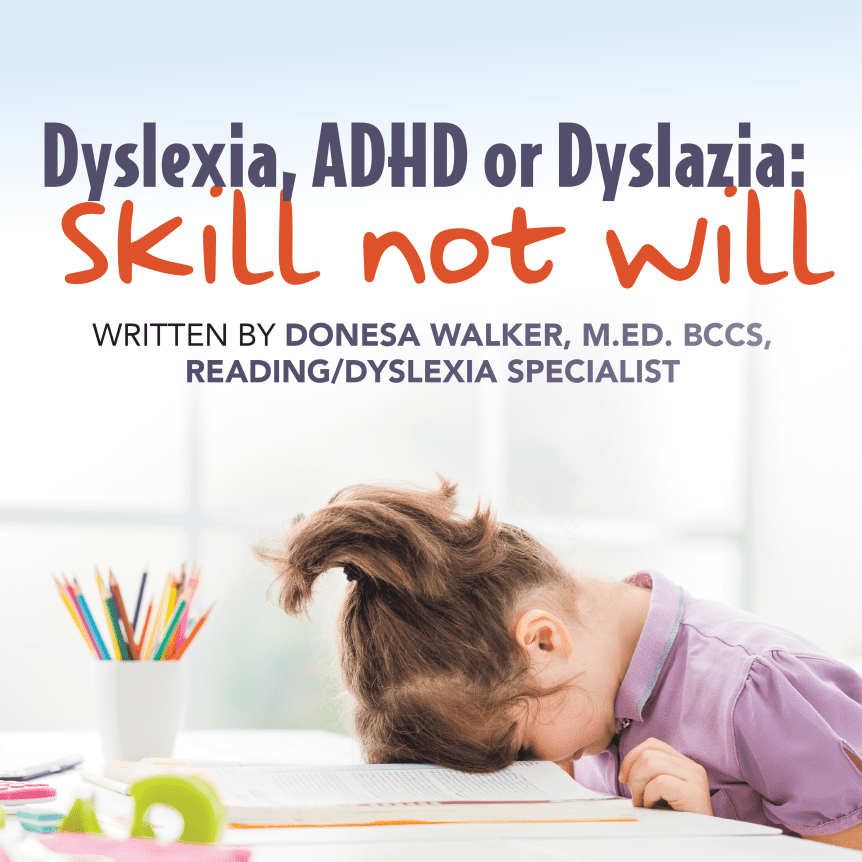The homework fight ensues again with the aggressive behavior and the meltdowns, the exhausting hours of fussing and sitting at the table, throwing tantrums and complete drama. When will it ever end? These are the comments and questions heard by many counselors and therapists as well as educational resource personnel on a daily basis. The question remains… is my child being lazy or are they truly struggling with learning issues? How do I know? The school says nothing is wrong, but I cannot do this anymore!
Dyslexia has as many as 9-12 types depending on which expert you are looking to and not all of these are addressed in the same manner at all. Dyslexia is usually defined as a processing issue of linguistic origin in a neurotypical person. However, there are neurodivergent thinkers who also struggle with the same cognitive weaknesses evident in dyslexic students of all ages.
The first step to understanding whether there is authentically an issue is by getting an assessment of the cognitive skills and looking at whether those skills are prevalently low or are there just gaps caused by interruptions in the learning process such as we see with the Summer Slide and Covid Learning Gap.
The second step is understanding the underlying weaknesses and choosing and interventional model that will best suit the learner and the family in getting the most out of the precious amount of time that you have with a child in the learning process.
Dr. J. Stuart Ablon in his book change*able, discusses how the lack of skill is the issue rather than a child willingly being defiant or lazy. In his book, Dr. Ablon, the Director of Think: Kids at Massachusetts General Hospital, shares how collaborative problem solving and realization/intervention of skill sets can change lives at home, school and at work. Recognizing that weak cognitive skills (IQ) and weaknesses in emotional IQ or ability to handle new situations and adapt can affect a person’s behavior whether the person is a child or an adult. The ability to recognize and address the weaknesses is one key to making change in daily lives. By identifying the underlying skill weaknesses in emotional and cognitive thinking processes, one can become more aware and reach out by getting the assistance needed to address these underlying weaknesses. One video of his Tedx Talk, Dr. J. Stuart Ablon: Kids Lack Skills, Not Will to Do Well – YouTube, shares how training the skill boosts the motivation.
Another approach to this same principle is called Growth Mindset by Dr. Carole Dweck. In her book, MINDSET: the new psychology of success, Stanford Psychologist, Dr. Dweck coined the term “Growth Mindset” which says that adopting the belief that talent can be developed with hard work, determination and help from others promotes growth. Those with a fixed mindset, however, believe their intelligence and skills are innate and therefore unlikely to be improved upon. In her research, she was able to demonstrate that mindset matters and is trainable. In her multitude of talks, books, and videos, she shares her thoughts and research on how our perspective on learning truly matters. Teaching a Growth Mindset – Carol Dweck – YouTube. The human brain is always growing, changing, learning and the perspective that learning and growing should be a journey that is an adventure and fun is one that I hold along with many other educational professionals and cognitive scientists of all walks. Learning is an ongoing process of life and understanding one’s own strengths and weaknesses in this process is a particularly important piece of that process.
Back to the question: is it a learning issue or a laziness issue?
Aren’t they one and the same? Personally, I am lazy about doing the things that are hard and not enjoyable to me as most of us are. We do them only because they must be done and some of us put it off forever (procrastinators), while others just do it to get it over with, (rushers). Learning should be about the joy of the process. School isn’t fun to those who struggle because of their skills. Behaving, problem solving, dealing with difficult decisions, even cleaning the bedroom isn’t always about unwillingness, many times it is lack of skill not will. Again, that first step is the knowledge of skill. Is the child, teen or adult who is having the difficulty unable to do or unwilling to do? How do you know? Have you assessed the abilities?
Dyslazia doesn’t have to be the way of thinking. Overwhelmed brains do not have to be the norm. Meltdowns and shutdowns should not be commonplace. Addressing the underlying weaknesses and being purposeful in our approach to others can be life changing for everyone around us. If you or someone you love struggles with learning or behavior, no matter what their age, it is not too late nor too early. Intervention is possible. Reach out to community resources around you. Whether the person has a learning difference that needs to be addressed or they need to address behavioral concerns, resources are available in our community.

